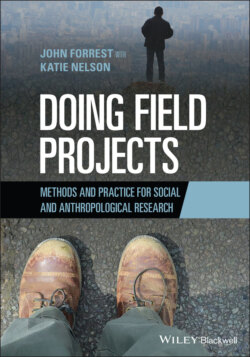Читать книгу Doing Field Projects - John Forrest - Страница 7
Foreword (Including a Word to Student Readers)
ОглавлениеWhen I was first asked to join this book as a supporting author, I was delighted to have the opportunity to contribute to such an innovative text. I had already reviewed a draft of the book and was impressed by the variety of field projects it contains as well as the depth by which each exercise is presented. I have been a college anthropology instructor for over 15 years and have written about qualitative methods and teaching and learning in anthropology textbooks and through my work as a founding member and Associate Editor of the Teaching and Learning Anthropology Journal. John (whom I personally refer to as Juan Alejandro – his birth name) is a number of years my senior and has the experience of a full life and career as an anthropologist and professor behind him. His own research background is varied and rich. His depth of knowledge and experience complements my passion for pedagogical accessibility and relevance. You will find that the exercises in this volume likewise represent these qualities. They are comprehensively classroom-tested and are engaging.
There are a number of fieldwork books in print, but none quite like this one. This text is designed for students, or others, with an interest in learning qualitative anthropological fieldwork methods, regardless of whether they intend to pursue a career in the social sciences. Through straightforward introductory exercises to more complex research approaches, you will learn step by step how to craft and execute research using qualitative fieldwork in a professional manner. Regardless of whether you have previous fieldwork experience or are new to qualitative research, you can gain valuable skills through these projects.
As you will learn, conducting ethnographic fieldwork at the undergraduate level has not always been supported historically within cultural anthropology. For many years, faculty were discouraged from teaching research methods, in part because they feared ethnographic research could not be conducted well without extensive advanced training. Yet in the past 20–30 years this trend has begun to change. Juan and I firmly believe learning to conduct fieldwork early in one’s academic career is extremely important. By learning fieldwork skills, you will likely gain far more than the ability to operationalize research techniques. You will learn, for instance, to use your senses of bodily perception to notice, observe, describe, and analyze a wide range of social and cultural phenomena around you. You will come to appreciate what you uniquely bring to fieldwork and other social contexts. You will recognize the ways that people interact with the space and objects around them in their physical environment. You will learn how to interview others and find meaning in their narration. You will learn from others by participating in the same activities they do. You will use numerical data, digital environments, and performances as ways to see seemingly ordinary activities in extraordinarily different ways. In sum, you will learn to think like an anthropologist.
I suspect you will carry many of the skills and perspectives you learn through the projects in this book with you throughout your future career and life. As I tell my students, anthropology is one of the few disciplines that intersect with nearly every other field of study or area of practice. Whether you study business, become a lawyer, go to medical school, work in construction, or take a job as a stockbroker or deep sea diver, you will find ways that fieldwork can help you in your work.
The work of being a human embedded in a cultural environment studying other humans and cultures can be challenging. But mostly, it is exciting. Best of luck to you on your fieldwork journey!
Katie Nelson, PhD
